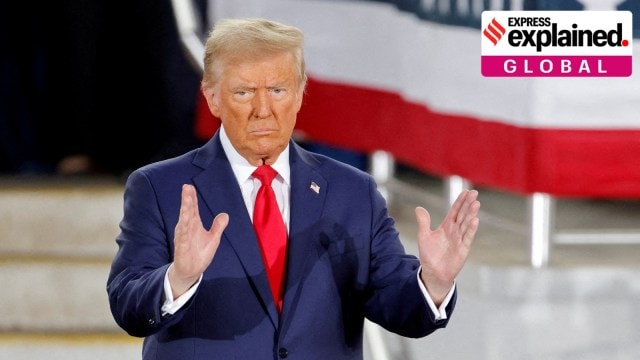What happens to Donald Trump’s legal cases now that he will be President?
Trump faces two federal indictments — the January 6 case, relating to the attack on the US Capitol by his supporters as he fought to stay in power after the 2020 election; and the classified documents case
 Former U.S. President Donald Trump gestures during a campaign event at Dorton Arena, in Raleigh, North Carolina, U.S. November 4, 2024. (REUTERS/Jonathan Drake/File Photo)
Former U.S. President Donald Trump gestures during a campaign event at Dorton Arena, in Raleigh, North Carolina, U.S. November 4, 2024. (REUTERS/Jonathan Drake/File Photo)Donald Trump has become President-elect of the United States while he faces four criminal cases.
Hopes of the Democratic Party that these legal troubles, including his conviction on 34 felony counts in a hush money case involving an adult film actor — a dubious first for a former President — would dent Trump’s chances of a return to the White House were dashed in spectacular fashion as the Republicans emphatically won the presidency and Senate, and set themselves up to take the House as well.
Trump will return to the Oval Office as the 47th President on January 20. What will happen to the cases against him?
Federal & state cases against Trump
Trump faces two federal indictments — the January 6 case, relating to the attack on the US Capitol by his supporters as he fought to stay in power after the 2020 election; and the classified documents case, relating to his handling of government documents he took from the White House to his private estate in Mar-a-Lago, Florida.
Trump also faces two cases in state courts — the hush money case in Manhattan; and the election case in Georgia, in which he has been indicted for attempting to reverse his defeat in the state in the 2020 election.
Different rules apply to the federal and state cases. As President, Trump will have greater control over the proceedings in the federal cases, which most analysts believe could now simply end. The cases in the states could drag on for longer, but proceedings are expected to be paused or considerably delayed.
Pardon, or drop cases
Article II, Section 2, Clause 1 of the US Constitution says the President “shall have Power to grant Reprieves and Pardons for Offences against the United States, except in Cases of Impeachment”.
In theory, Trump could pardon himself — a step that he has been reported to have considered during his first term. However, no President has done that before, and a legal challenge could follow.
The need for pardon could be eliminated if the Department of Justice decides to dismiss the cases. Before the election, Trump had said he would fire Special Counsel Jack Smith, who is prosecuting the federal cases, “within two seconds” if he won.
The case in Florida was dismissed by a federal judge this July on the ground that the appointment of the Special Counsel was violative of the constitution, and is now in appeal. And The New York Times has reported that Smith has begun looking at avenues to end both cases in line with a DoJ policy from 2000 that says “the indictment or criminal prosecution of a sitting President would unconstitutionally undermine the capacity of the executive branch to perform its constitutionally assigned functions”.
Manhattan sentencing
In May, a jury in Manhattan convicted Trump of falsifying records to cover up a sex scandal. He is scheduled to be sentenced on November 26 — however, it is expected that his lawyers will seek a long postponement.
Trump is expected to argue that his sentencing would heavily distract from and disrupt the process of presidential transition, and impact his ability to choose his cabinet and take charge of the office he has been elected to.
The NYT said the judge, Justice Juan M Merchan, who has already granted Trump two delays, may agree to another postponement. If he does not, Trump will appeal, and the issue could ultimately go to the Supreme Court.
The Financial Times said in a report that legal scholars believe it would be “constitutionally unviable” for a serving President to be sent to jail, which would make it “likely that sentencing will be postponed at least until after the next presidential election”.
The report quoted Prof Paul Butler of Georgetown Law as saying, “At this point, Trump has essentially won in all four cases.”



- 01
- 02
- 03
- 04
- 05



































